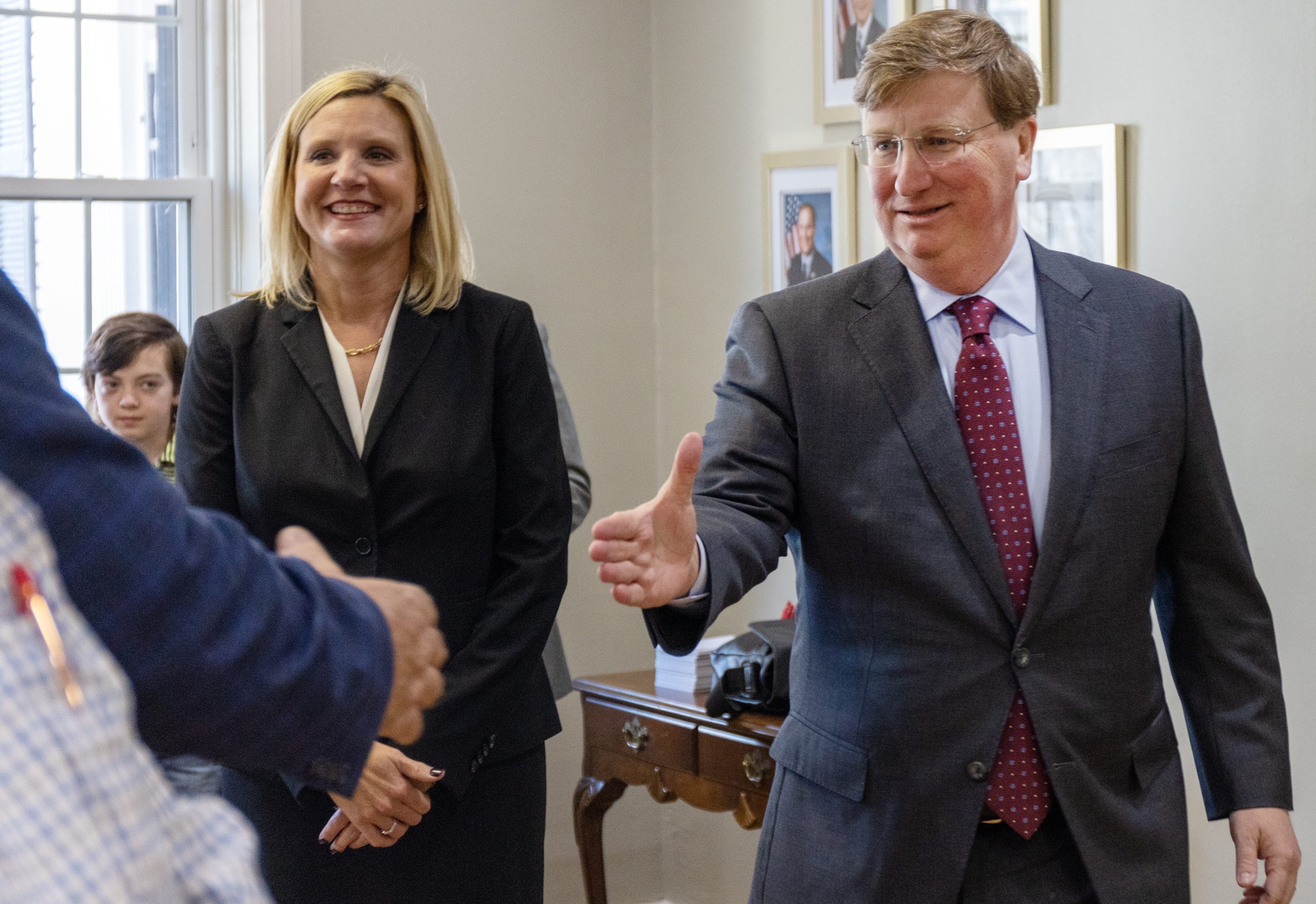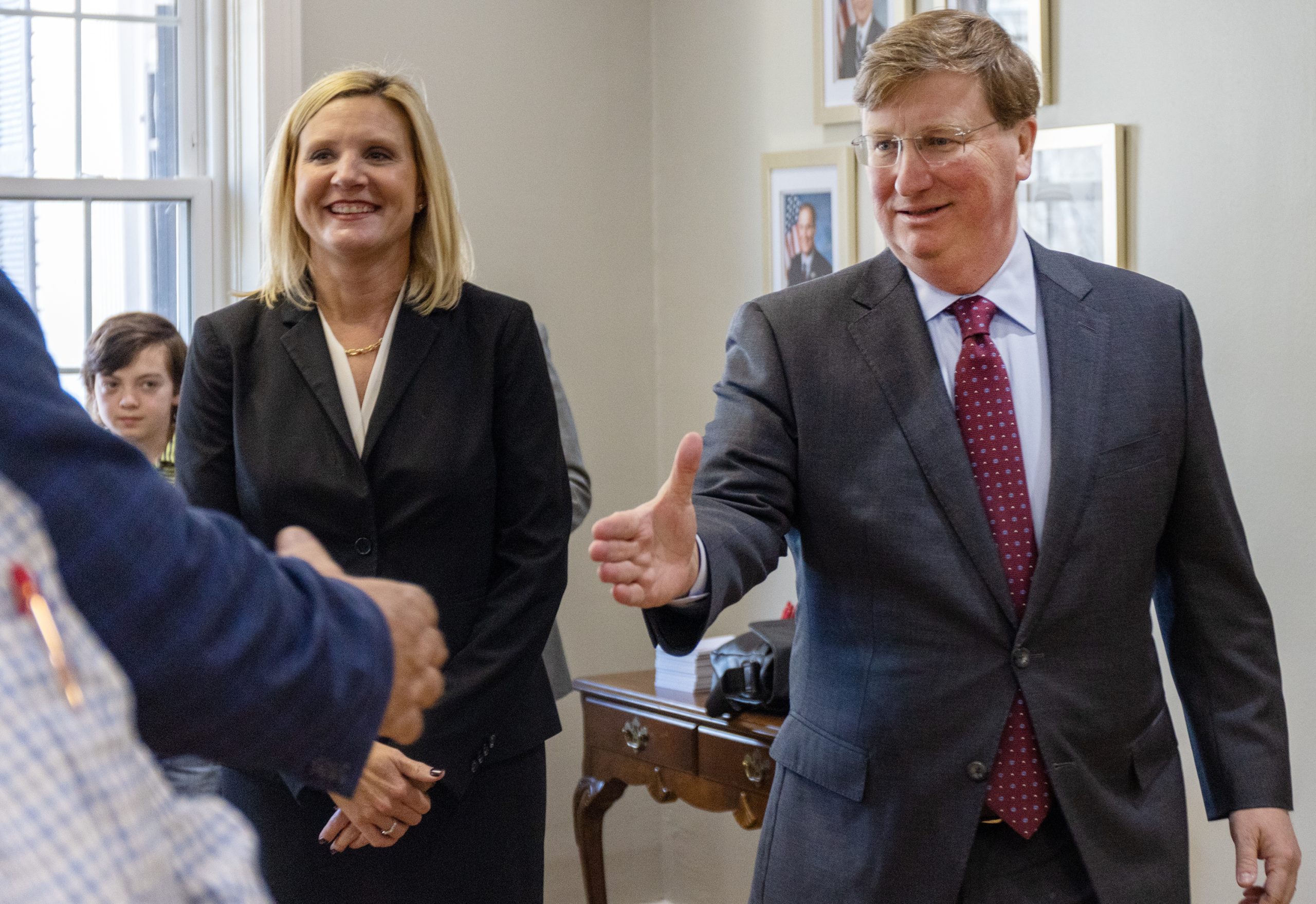Mississippi Today
Gov. Tate Reeves taps another major campaign donor for government appointment


Gov. Tate Reeves taps another major campaign donor for government appointment
Gov. Tate Reeves has appointed one of his top campaign donors to the Mississippi Gaming Commission, growing a list of Reeves insiders who have received government jobs in his first term in office.
Reeves appointed Kent Nicaud, the president and CEO of Gulfport Memorial Hospital, to serve the remainder of the term of former Gaming Commissioner Al Hopkins, who died in February.
If Nicaud is confirmed, he would join another major Reeves donor on the three-member Gaming Commission. The governor appointed Franc Lee, a payday loan magnate and Reeves’ largest individual donor, to the commission in 2021.
Gaming commissioners receive a modest salary from taxpayers — $40 per day — and are reimbursed by the state for travel and meals. The commission is tasked with regulating the casino gaming industry, which brings the state hundreds of millions in tax revenue each year. That revenue has become necessary to fund basic public services across Mississippi.
Nicaud has been one of Reeves’ top donors over the past few years, writing checks totaling more than $100,000, including $41,000 in 2022 alone. Nicaud’s fundraising influence led Reeves to appoint him to his gubernatorial campaign finance committee in 2019.
Reeves also appointed Nicaud’s wife Jenny Nicaud as an administrative law judge for the Mississippi Workers Compensation Commission in 2021. Kent and Jenny Nicaud’s son Jourdan Nicaud has also been a campaign donor to the governor, giving at least $36,000 to Reeves since 2018.
READ MORE: Kent Nicaud hosts in-person fundraiser for Gov. Tate Reeves during major COVID-19 spike
With the appointments, Reeves is growing the list of his personal campaign donors who have later been appointed to taxpayer-funded government positions by the governor.
Another one of Reeves’ pending appointments is Gerard Gibert, the host of a conservative Supertalk Mississippi radio show and regular campaign donor of Reeves. Gibert, first appointed to the Mississippi Lottery Corporation board by former Gov. Phil Bryant, was reappointed by Reeves this year after writing several checks to Reeves’ campaign accounts since 2017.
In 2021, Reeves appointed three campaign donors to the Institutions of Higher Learning Board of Trustees — among the state’s most coveted government appointments — and two campaign donors to the Mississippi Community College Board.
Businessman Johnny McRight gave Reeves $50,000 in the four years before his 2021 IHL appointment. Businessman Luke Montgomery gave Reeves $14,500 in the years before his 2021 MCBB appointment.
Gregg Rader, a Columbus businessman, gave Reeves $85,000 in the months leading up to his 2021 IHL appointment. And Rader has continued the flow of money to Reeves’ campaign coffers even after his appointment, writing another $30,000 check to the governor in 2022.
William Symmes, a Gulfport lawyer appointed by Reeves to the MCCB in 2021 after a small 2020 donation to the governor, acknowledged in an interview at the time that his personal connections to Reeves led to his appointment, but said it is logical the governor would pick people who know and support him.
“Obama said it best: ‘Elections have consequences,’” Symmes told Mississippi Today in 2021. “I think that one of those consequences is you’re able to put people around you that you feel comfortable and work well with.”
READ MORE: They wrote campaign checks to Tate Reeves. Then he appointed them to powerful ed boards.
Mississippi Today reached out to Reeves’ office before this story published and asked why the governor appointed Nicaud to the Gaming Commission. We also asked what Reeves would say to taxpayers who are funding his campaign insider appointments during his first term as governor.
“Mississippi Today is not a news organization, it is an unregistered Democrat super PAC and obviously acting like one again today,” Reeves’ deputy chief of staff Cory Custer said in an emailed statement, declining to answer the questions.
Nicaud faces Senate confirmation before he can assume the Gaming Commission post. He would finish out the term of Alben “Al” Hopkins, who was first appointed to the commission by former Gov. Phil Bryant in 2015 and died in February 2023.
In 2022, Reeves reappointed Hopkins, who faced some political heat in the Senate before ultimately being confirmed for a new term.
Just a few months before Reeves reappointed Hopkins, the Reeves campaign cashed a check: $1,000 from Alben Hopkins LLC.
This article first appeared on Mississippi Today and is republished here under a Creative Commons license.
Mississippi Today
On this day in 1977, Alex Haley awarded Pulitzer for ‘Roots’

April 19, 1977

Alex Haley was awarded a special Pulitzer Prize for “Roots,” which was also adapted for television.
Network executives worried that the depiction of the brutality of the slave experience might scare away viewers. Instead, 130 million Americans watched the epic miniseries, which meant that 85% of U.S. households watched the program.
The miniseries received 36 Emmy nominations and won nine. In 2016, the History Channel, Lifetime and A&E remade the miniseries, which won critical acclaim and received eight Emmy nominations.
This article first appeared on Mississippi Today and is republished here under a Creative Commons Attribution-NoDerivatives 4.0 International License.![]()
Mississippi Today
Speaker White wants Christmas tree projects bill included in special legislative session

House Speaker Jason White sent a terse letter to Lt. Gov. Delbert Hosemann on Thursday, saying House leaders are frustrated with Senate leaders refusing to discuss a “Christmas tree” bill spending millions on special projects across the state.
The letter signals the two Republican leaders remain far apart on setting an overall $7 billion state budget. Bickering between the GOP leaders led to a stalemate and lawmakers ending their regular 2025 session without setting a budget. Gov. Tate Reeves plans to call them back into special session before the new budget year starts July 1 to avoid a shutdown, but wants them to have a budget mostly worked out before he does so.
White’s letter to Hosemann, which contains words in all capital letters that are underlined and italicized, said that the House wants to spend cash reserves on projects for state agencies, local communities, universities, colleges, and the Mississippi Department of Transportation.
“We believe the Senate position to NOT fund any local infrastructure projects is unreasonable,” White wrote.
The speaker in his letter noted that he and Hosemann had a meeting with the governor on Tuesday. Reeves, according to the letter, advised the two legislative leaders that if they couldn’t reach an agreement on how to disburse the surplus money, referred to as capital expense money, they should not spend any of it on infrastructure.
A spokesperson for Hosemann said the lieutenant governor has not yet reviewed the letter, and he was out of the office on Thursday working with a state agency.
“He is attending Good Friday services today, and will address any correspondence after the celebration of Easter,” the spokesperson said.
Hosemann has recently said the Legislature should set an austere budget in light of federal spending cuts coming from the Trump administration, and because state lawmakers this year passed a measure to eliminate the state income tax, the source of nearly a third of the state’s operating revenue.
Lawmakers spend capital expense money for multiple purposes, but the bulk of it — typically $200 million to $400 million a year — goes toward local projects, known as the Christmas Tree bill. Lawmakers jockey for a share of the spending for their home districts, in a process that has been called a political spoils system — areas with the most powerful lawmakers often get the largest share, not areas with the most needs. Legislative leaders often use the projects bill as either a carrot or stick to garner votes from rank and file legislators on other issues.
A Mississippi Today investigation last year revealed House Ways and Means Chairman Trey Lamar, a Republican from Sentobia, has steered tens of millions of dollars in Christmas tree spending to his district, including money to rebuild a road that runs by his north Mississippi home, renovate a nearby private country club golf course and to rebuild a tiny cul-de-sac that runs by a home he has in Jackson.
There is little oversight on how these funds are spent, and there is no requirement that lawmakers disburse the money in an equal manner or based on communities’ needs.
In the past, lawmakers borrowed money for Christmas tree bills. But state coffers have been full in recent years largely from federal pandemic aid spending, so the state has been spending its excess cash. White in his letter said the state has “ample funds” for a special projects bill.
“We, in the House, would like to sit down and have an agreement with our Senate counterparts on state agency Capital Expenditure spending AND local projects spending,” White wrote. “It is extremely important to our agencies and local governments. The ball is in your court, and the House awaits your response.”
This article first appeared on Mississippi Today and is republished here under a Creative Commons Attribution-NoDerivatives 4.0 International License.
Mississippi Today
Advocate: Election is the chance for Jackson to finally launch in the spirit of Blue Origin

Editor’s note: This essay is part of Mississippi Today Ideas, a platform for thoughtful Mississippians to share fact-based ideas about our state’s past, present and future. You can read more about the section here.
As the world recently watched the successful return of Blue Origin’s historic all-women crew from space, Jackson stands grounded. The city is still grappling with problems that no rocket can solve.
But the spirit of that mission — unity, courage and collective effort — can be applied right here in our capital city. Instead of launching away, it is time to launch together toward a more just, functioning and thriving Jackson.
The upcoming mayoral runoff election on April 22 provides such an opportunity, not just for a new administration, but for a new mindset. This isn’t about endorsements. It’s about engagement.
It’s a moment for the people of Jackson and Hinds County to take a long, honest look at ourselves and ask if we have shown up for our city and worked with elected officials, instead of remaining at odds with them.
It is time to vote again — this time with deeper understanding and shared responsibility. Jackson is in crisis — and crisis won’t wait.
According to the U.S. Census projections, Jackson is the fastest-shrinking city in the United States, losing nearly 4,000 residents in a single year. That kind of loss isn’t just about numbers. It’s about hope, resources, and people’s decision to give up rather than dig in.
Add to that the long-standing issues: a crippled water system, public safety concerns, economic decline and a sense of division that often pits neighbor against neighbor, party against party and race against race.
Mayor Chokwe Antar Lumumba has led through these storms, facing criticism for his handling of the water crisis, staffing issues and infrastructure delays. But did officials from the city, the county and the state truly collaborate with him or did they stand at a distance, waiting to assign blame?
On the flip side, his runoff opponent, state Sen. John Horhn, who has served for more than three decades, is now seeking to lead the very city he has represented from the Capitol. Voters should examine his legislative record and ask whether he used his influence to help stabilize the administration or only to position himself for this moment.
Blaming politicians is easy. Building cities is hard. And yet that is exactly what’s needed. Jackson’s future will not be secured by a mayor alone. It will take so many of Jackson’s residents — voters, business owners, faith leaders, students, retirees, parents and young people — to move this city forward. That’s the liftoff we need.
It is time to imagine Jackson as a capital city where clean, safe drinking water flows to every home — not just after lawsuits or emergencies, but through proactive maintenance and funding from city, state and federal partnerships. The involvement of the U.S. Environmental Protection Agency in the effort to improve the water system gives the city leverage.
Public safety must be a guarantee and includes prevention, not just response, with funding for community-based violence interruption programs, trauma services, youth job programs and reentry support. Other cities have done this and it’s working.
Education and workforce development are real priorities, preparing young people not just for diplomas but for meaningful careers. That means investing in public schools and in partnerships with HBCUs, trade programs and businesses rooted right here.
Additionally, city services — from trash collection to pothole repair — must be reliable, transparent and equitable, regardless of zip code or income. Seamless governance is possible when everyone is at the table.
Yes, democracy works because people show up. Not just to vote once, but to attend city council meetings, serve on boards, hold leaders accountable and help shape decisions about where resources go.
This election isn’t just about who gets the title of mayor. It’s about whether Jackson gets another chance at becoming the capital city Mississippi deserves — a place that leads by example and doesn’t lag behind.
The successful Blue Origin mission didn’t happen by chance. It took coordinated effort, diverse expertise and belief in what was possible. The same is true for this city.
We are not launching into space. But we can launch a new era marked by cooperation over conflict, and by sustained civic action over short-term outrage.
On April 22, go vote. Vote not just for a person, but for a path forward because Jackson deserves liftoff. It starts with us.
Pauline Rogers is a longtime advocate for criminal justice reform and the founder of the RECH Foundation, an organization dedicated to supporting formerly incarcerated individuals as they reintegrate into society. She is a Transformative Justice Fellow through The OpEd Project Public Voices Fellowship.
This article first appeared on Mississippi Today and is republished here under a Creative Commons Attribution-NoDerivatives 4.0 International License.![]()
-

 Mississippi Today6 days ago
Mississippi Today6 days agoLawmakers used to fail passing a budget over policy disagreement. This year, they failed over childish bickering.
-

 Mississippi Today6 days ago
Mississippi Today6 days agoOn this day in 1873, La. courthouse scene of racial carnage
-

 Local News6 days ago
Local News6 days agoSouthern Miss Professor Inducted into U.S. Hydrographer Hall of Fame
-

 News from the South - Alabama News Feed5 days ago
News from the South - Alabama News Feed5 days agoFoley man wins Race to the Finish as Kyle Larson gets first win of 2025 Xfinity Series at Bristol
-

 News from the South - Alabama News Feed5 days ago
News from the South - Alabama News Feed5 days agoFederal appeals court upholds ruling against Alabama panhandling laws
-

 News from the South - Florida News Feed7 days ago
News from the South - Florida News Feed7 days agoSevere weather has come and gone for Central Florida, but the rain went with it
-

 News from the South - Florida News Feed6 days ago
News from the South - Florida News Feed6 days agoJacksonville University only school with 2 finalist teams in NASA’s 2025 Human Lander Challenge
-

 News from the South - Alabama News Feed7 days ago
News from the South - Alabama News Feed7 days agoBellingrath Gardens previews its first Chinese Lantern Festival














































